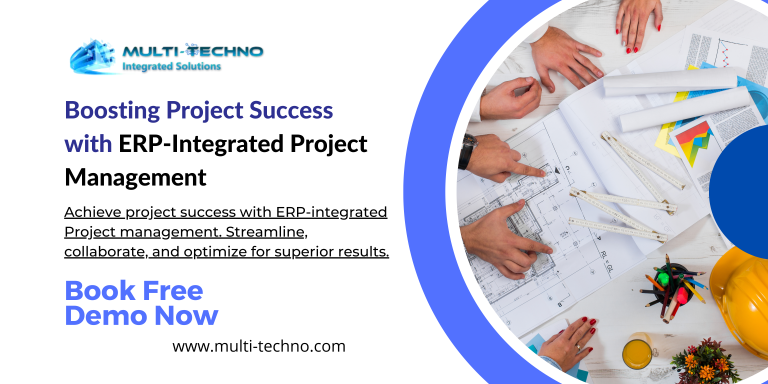Multi-Techno Integrated Solution

Table of Contents
ToggleUnlocking Project Success: The Power of ERP-Integrated Project Management
In today’s fast-paced business environment, successful project management is crucial for organizations to thrive. Efficiently managing projects from initiation to completion can be a complex task involving various stakeholders, resources, and timelines. To ensure project success, many companies are turning to Enterprise Resource Planning (ERP) systems integrated with project management functionalities. This article explores the benefits of ERP-integrated project management and how it can enhance project outcomes.
Understanding ERP-Integrated Project Management
ERP systems are comprehensive software solutions that integrate various business functions, including finance, human resources, supply chain management, and project management, into a single unified system. By integrating project management with ERP, organizations can streamline project-related processes, improve collaboration, enhance visibility, and achieve better control over project costs, resources, and schedules.
Streamlining Project-Related Processes
Traditional project management often involves multiple disconnected systems and manual processes, leading to inefficiencies, data duplication, and communication gaps. With ERP-integrated project management, organizations can centralize project-related activities such as planning, resource allocation, task tracking, and reporting. This streamlines processes eliminates duplicate data entry, and provides real-time updates, ensuring everyone has access to accurate and up-to-date project information.
Enhancing Collaboration and Communication
Effective collaboration and communication are vital for project success. ERP-integrated project management platforms facilitate seamless communication and collaboration among project teams, stakeholders, and departments. With features like shared calendars, document management, and real-time messaging, team members can collaborate efficiently, share project-related information, and address issues promptly. This ensures better alignment, reduces misunderstandings and improves decision-making throughout the project lifecycle.
Improving Visibility and Control
ERP systems offer a holistic view of an organization’s operations, including project activities. By integrating project management with ERP, stakeholders gain comprehensive visibility into project progress, resource utilization, costs, and milestones. Real-time dashboards, reports, and analytics provide accurate and timely project insights, enabling stakeholders to make informed decisions, identify bottlenecks, and take corrective actions promptly. This improved visibility and control lead to better project outcomes and increased client satisfaction.
Optimal Resource Allocation
Resource management is critical for project success. ERP-integrated project management enables organizations to effectively allocate and manage resources across projects. By maintaining a centralized resource repository and using advanced resource planning tools, organizations can optimize resource allocation, prevent overbooking or underutilization, and balance workloads. This ensures that the right resources are assigned to the right tasks at the right time, leading to improved productivity and project efficiency.
Integrated Financial Management
Projects often involve significant financial considerations, including budgeting, cost tracking, and invoicing. With ERP-integrated project management, financial data is seamlessly integrated with project activities. This enables organizations to track project costs accurately, monitor budget adherence, generate invoices based on milestones or actuals, and streamline financial processes. By integrating financial management with project management, organizations can ensure financial transparency, minimize errors, and improve profitability.
Risk Management and Compliance
Effective risk management and compliance are essential for project success and regulatory adherence. ERP-integrated project management platforms enable organizations to identify, assess, and mitigate project risks effectively. By integrating risk management functionalities into the project management system, stakeholders can document risks, assign responsibilities, track mitigation actions, and monitor risk exposure throughout the project lifecycle. This ensures proactive risk mitigation, improves project resilience, and enhances compliance with regulatory requirements.
Scalability and Flexibility
ERP systems are designed to accommodate the evolving needs of growing organizations. ERP-integrated project management provides scalability and flexibility, allowing organizations to handle projects of varying sizes and complexities. As project portfolios expand, organizations can easily scale up project management functionalities within the ERP system, add new modules, or integrate with other systems seamlessly. This adaptability ensures that project management capabilities align with organizational growth and changing project requirements.
Conclusion
In today’s competitive business landscape, successful project management is a key differentiator for organizations. By leveraging ERP-integrated project management, organizations can streamline processes, enhance collaboration, improve visibility and control, optimize resource allocation, integrate financial management, manage risks effectively, and ensure scalability. These benefits contribute to higher project success rates, improved client satisfaction, and enhanced organizational performance. Investing in ERP-integrated project management is a strategic decision that empowers organizations to achieve their project goals efficiently in an increasingly dynamic business environment.
About Us
ERP software and systems are designed and implemented by Multi-Techno, a registered company. By combining data from financials, sales, CRM, inventories, and operations, businesses can increase productivity, make better decisions, and increase profitability with the aid of our ERP System, a single, integrated software platform.
Quick Links
Contact Us
Office # 100, 101 Second Floor Kohinoor 1, Faisalabad, Pakistan
